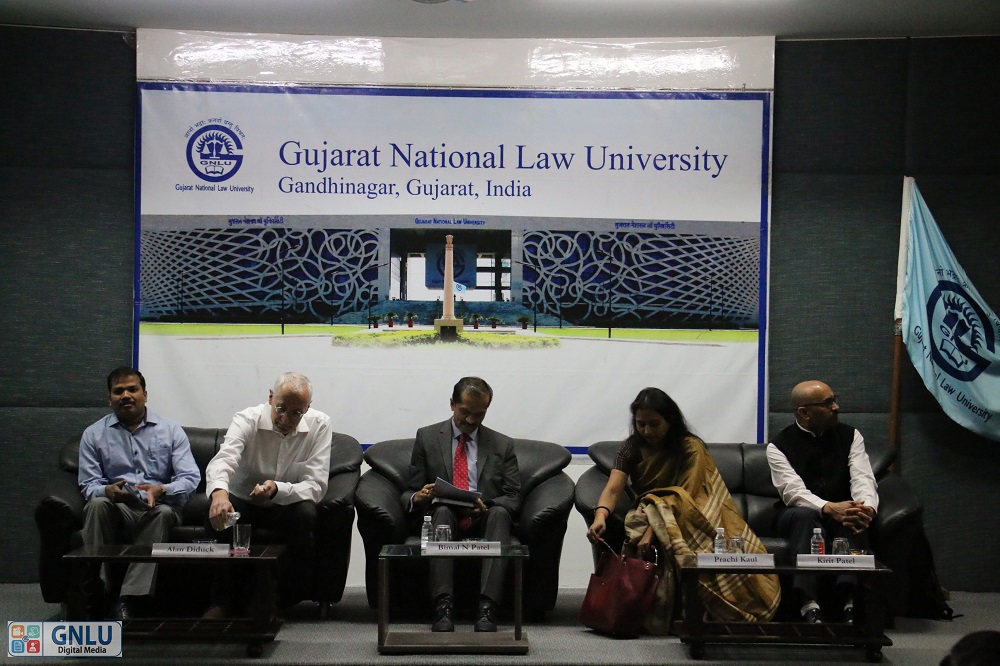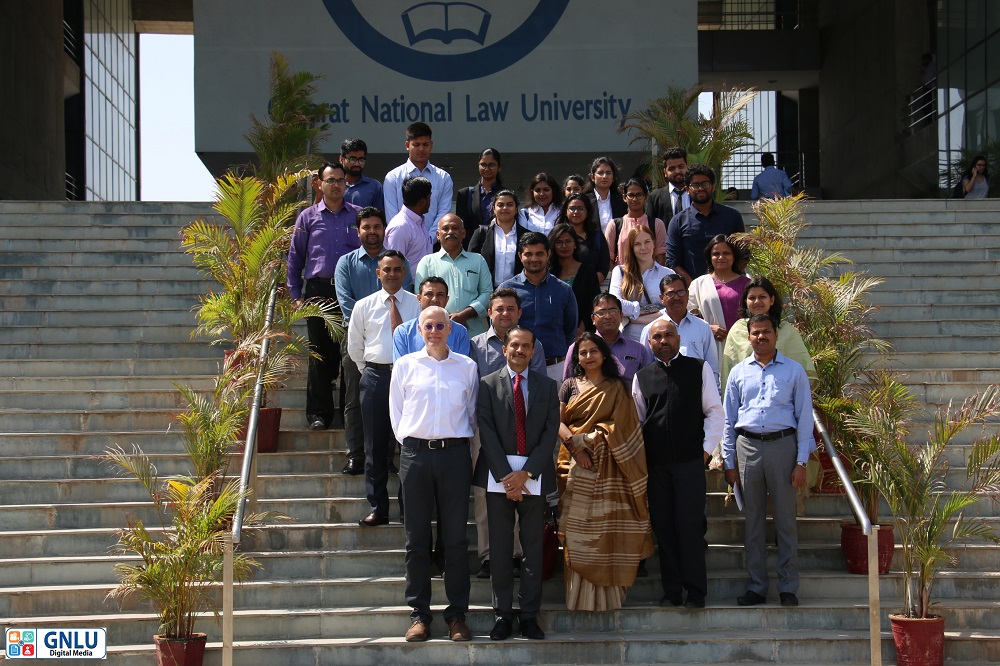GNLU Concludes two days International Symposium on Environmental Justice and Sustainable Development Goals (15-16 March, 2019)


On March 15, 2019: GNLU inaugurated the Symposium on Environmental Justice and Sustainable Development Goals with the stated objective of Balancing Economy and Environment for Inclusive and Equitable Growth. This symposium is a result of a collaboration between Gujarat National Law University, the University of Winnipeg, the Canadian Mennonite University, Canada.
The symposium was graced by Prof. (Dr.) Bimal N. Patel, Director of GNLU and Member of the National Security Advisory Board, Government of India, Dr. Prachi Kaul, Director of the Shastri Indo Canada Institute, New Delhi, Prof. Alan Diduck from the University of Winnipeg, Canada and Prof. Kirit Patel from the Menno Simons College, CMU, Canada. They have drawn attention of theoretical insights of law and development scholars who have questioned traditional meanings of environmental justice based simply on principles of fair treatment and equity in distribution of environmental risk. Prof. Patel stressed upon the development is sustainable when it “meets the needs of the present without compromising the ability of future generations to meet their own needs.” The principles of sustainable development are enshrined in the 1992 Rio Declaration on Environment and Development and confirmed in subsequent instruments. They include equity and justice for present and future generations - inter - and intra - generational equity; and recognize that “Human beings are at the centre of concerns for sustainable development.
The UN Declaration on the Right to Development, adopted on 4 December 1986, defines development as ‘an inalienable human right by virtue of which every human person and all peoples are entitled to participate in, contribute to, and enjoy economic, social, cultural and political development, in which all human rights and fundamental freedoms can be fully realized.’ It places on States a duty to formulate national and international development policies aimed at the constant improvement of human well-being as well as a duty to cooperate to ensure development and eliminate obstacles to development. The Declaration calls for disarmament and upholds self-determination and sovereignty over natural wealth and resources; requires active, free and meaningful participation in development and fair distribution of its benefits; and makes equality of opportunity for development ‘a prerogative both of nations and of individuals who make up nations’. It supports a social and international order in which all rights and freedoms can be realized by all, as envisioned in the Universal Declaration of Human Rights.
Development is sustainable when it “meets the needs of the present without compromising the ability of future generations to meet their own needs.”
Dr. Prachi Kaul, Director of the Shastri Indo Canada Institute, New Delhi. The Shastri Indo Canada Institute is a binational organization that promotes intellectual and cultural linkages between India and Canada through research, dialogue and exchange, to improve the quality of life of people in both countries. The Shastri Institute plays a pivotal role in Indo-Canada relations and greatly facilitated scholarship, research and exchange between Indian and Canadian universities.
The Conference is an attempt to stimulate and sustain conversation on environmental justice. The pivot of the all discussion is goal 16 of the sustainable development goals – which lays a much-needed emphasis on access to justice and effective, accountable and inclusive institutions. This underlines the strong connections between sustainable development and environmental justice. Over the next couple of days, two panels over 5 sessions will grapple with issues concerning all aspects of environmental justice – procedural, distributive, recognitional and restorative. The sub themes for the symposium are diverse and comprehensive ranging from the historical reviews of legislation, policy, institutions and jurisprudence, the use and abuse of public interest litigation, to a re-gendering of the conventional legal system, and the search for alternative dispute resolution mechanisms in environmental conflicts.
Prof. Alan Diduck and Prof Kirit Patel from The Winnipeg University and Canadian Mennonite University, Winnipeg given importance how they have entered into relations. All administrators always work hard to raise financial resources and establish new institutional collaboration. Dr Bimal, the order is reverse, he always said let us work together, resources will follow. It is true if you wait for financial resources to incubate and implement new idea, very often by the time resource come, ideas become either obsolete or innovator loses patience moves on to something else. Point it out with Shastri’s example.
The Indian judiciary is known for innovations in the legal system. The PIL, Green Benches, NGT are indeed some of the outstanding examples of legal innovations that have been recognized across the world. In the last two decades, more than 40 countries have established environmental courts at federal or local levels in their countries.
The creation of PIL is undoubtedly a credible indicator of the judiciary’s intention to address poverty, social exclusion, income inequality, and power imbalances. However, the pro-poor reputation of the judiciary has come under question in the neoliberal era. Given the unique history and phenomenal rise of judicial environmentalism in India, environmental justice issues require careful examination.
The enactment of the NGT has come at a time of accelerated economic growth in India marked by an average GDP increase per year of 7% between 1995 and 2014 (IMF 2015). The economic surge has, however, been clouded by widespread environmental degradation, income inequality, and rising poverty.
GNLU has played an instrumental role in organizing this conference. GNLU has been an ongoing partner with Environmental Justice and the Poor, conducting environmental research and providing tremendous institutional support to student researchers while in India. Several faculty members from GNLU have also been directly involved in the research.
